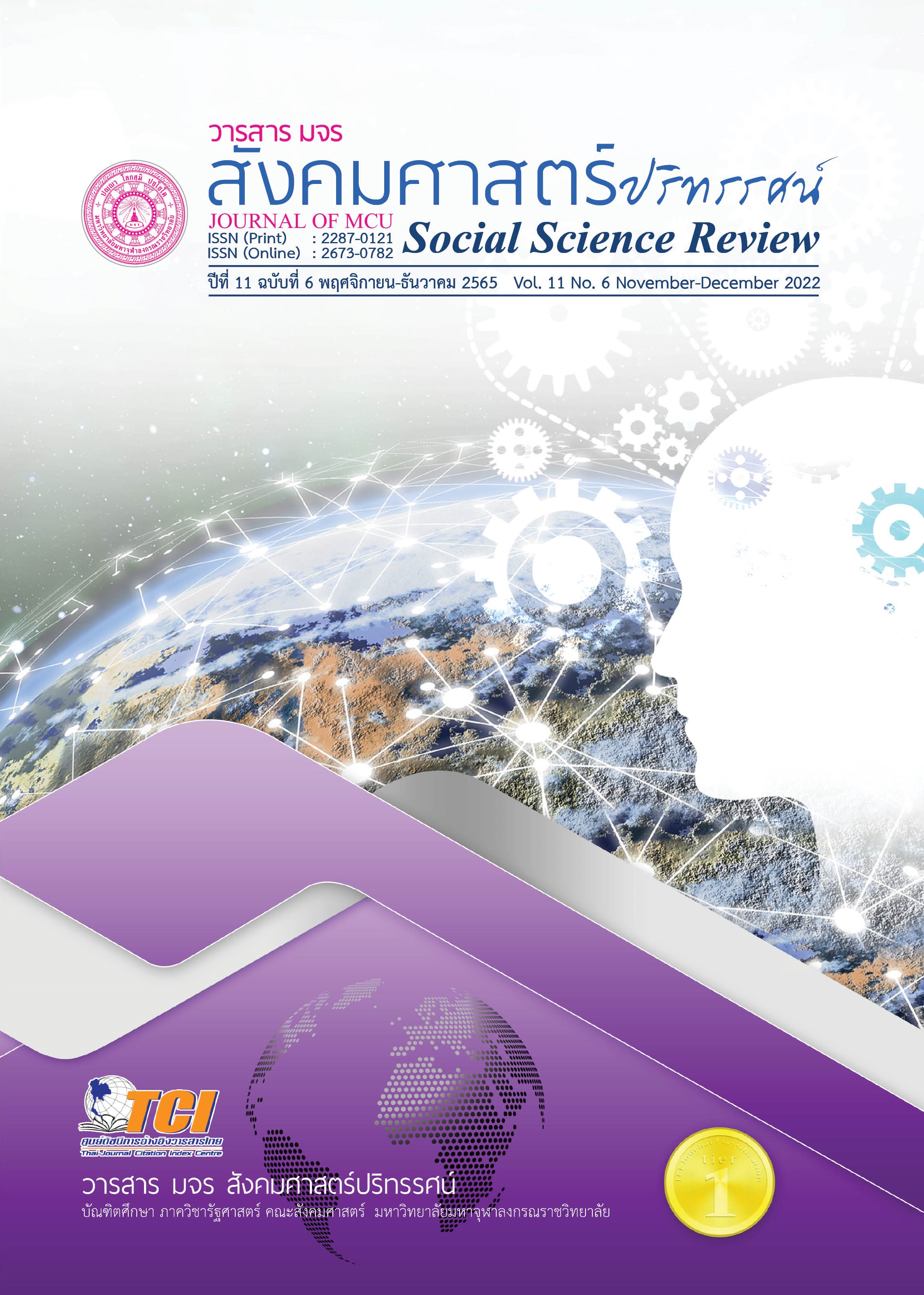บทบาทพระสงฆ์: ท่ามกลางวิกฤตของสังคมไทย
คำสำคัญ:
บทบาทพระสงฆ์, สังคมไทยบทคัดย่อ
พระสงฆ์เป็นผู้มีบทบาทสำคัญและมีความสัมพันธ์อย่างแนบแน่นต่อชุมชนและสังคม พระสงฆ์ ให้ความรู้ และแนวทางปฏิบัติอันเป็นประโยชน์แก่การพัฒนาคุณภาพชีวิตแก่ประชาชนในชุมชน ส่งเสริมให้ใช้หลักพุทธธรรมในการดำเนินชีวิตเพื่อเป็นการพัฒนาคุณภาพชีวิตให้ดีขึ้น เกิดวิกฤตของสังคมไทย ปัญหาทางการเมือง ปัญหาเศรษฐกิจการปิดตัวของภาคการผลิตและภาคบริการก่อให้เกิดการตกงานครั้งใหญ่ในสังคมไทย เกิดการว่างงานและยากจน การระบาดของเชื้อโควิด-19 ที่สังคมโลกและสังคมไทยต้องเผชิญกับภัยคุกคาม ปัญหาความมั่นคงด้านสาธารณสุข ปัญหาฝุ่นพีเอ็ม 2.5 ปัญหาภัยพิบัติทางธรรมชาติที่ขยายตัวในเชิงพื้นที่เป็นวงกว้าง และเป็นปัญหาที่ส่งผลกระทบต่อชีวิตของเกษตรกรในชนบทอย่างมาก บทบาทของพระสงฆ์ ด้านการเผยแผ่ ต้องรู้เท่าทันการเปลี่ยนแปลงและปรากฏการณ์ของสังคม บทบาทที่แสดงออกจริงตามนโยบายทางบ้านเมืองภายใต้พระราชบัญญัติคณะสงฆ์ พ.ศ. 2505 และ (ฉบับที่ 4 ) พ.ศ. 2561 การส่งเสริมการเผยแผ่หลักธรรมของพระพุทธศาสนาให้เกิดการพัฒนาจิตใจและปัญญา มีภาระหน้าที่จะต้องเข้าไปมีส่วนร่วมกับสังคมตามภาระกิจหลัก ด้านการสาธารณสงเคราะห์ประชาชน ต้องมีองค์ความรู้ที่แท้จริงเป็นฐานดำเนินการ เช่น รักษาโรคโดยใช้สมุนไพร เยียวยาผู้ติดยาเสพติด บทบาทลักษณะนี้ อาจจะไม่ใช่บทบาทโดยตรงของพระสงฆ์ แต่เป็นบทบาทที่ยอมรับได้ของสังคม และไม่ขัดต่อพระธรรมวินัย การเป็นผู้นำด้านการพัฒนาชุมชน โดยอาศัยจุดแข็งของพระสงฆ์ไทยที่มีภาพลักษณ์โดดเด่นเรื่องการเป็นผู้นำ การรักษาสืบทอดวัฒนธรรมประเพณี จะต้องยึดกรอบของพระธรรมวินัยเป็นหลัก และสามารถบูรณาการให้สอดคล้องกับยุคสมัย
เอกสารอ้างอิง
กองแผนงาน กรมการศาสนา กระทรวงศึกษาธิการ. (2540). คู่มือพระสังฆาธิการว่าด้วยพระราชบัญญัติ กฎ ระเบียบและคำสั่งของคณะสงฆ์. กรุงเทพฯ: โรงพิมพ์การศาสนา.
จำนงค์ อดิวัฒนสิทธิ์ และคณะ. (2548). สังคมวิทยาตามแนวพุทธ์. กรุงเทพฯ: สำนักพิมพ์มหาวิทยาลัยเกษตรศาสตร์.
พระเทพรัตนสุธี (สมศักดิ์ โชตินฺธโร). (2553). บทบาทการบริหารกิจการคณะสงฆ์ด้านการปกครองจังหวัดปทุมธานี (วิทยานิพนธ์ปริญญาพุทธศาสตรมหาบัณฑิต สาขาวิชาการจัดการเชิงพุทธ) พระนครศรีอยุธยา: มหาวิทยาลัยมหาจุฬาลงกรณราชวิทยาลัย.
พระเทพเวที (ป.อ. ปยุตฺโต). (2535). พจนานุกรมพุทธศาสตร์ ฉบับประมวลธรรม (พิมพ์ครั้งที่ 7). กรุงเทพฯ: โรงพิมพ์มหาจุฬาลงกรณราชวิทยาลัย.
พระมหาพนมนคร มีราคา. (2549). การดำรงสมณเพศของสามเณรโรงเรียนมหาวชิราลงกรณราชวิทยาลัย อำเภอวังน้อย จังหวัดพระนครศรีอยุธยา (วิทยานิพนธ์ปริญญาศิลปศาสตรมหาบัณฑิต สาขาวิชาจิตวิทยาชุมชน) กรุงเทพฯ: มหาวิทยาลัยศิลปากร.
พินิจ ลาภธนานันท์. (2544). กระบวนการเปลี่ยนแปลงทางสังคมกับการปรับเปลี่ยนบทบาทการพัฒนาของพระสงฆ์นักพัฒนาในภาคอีสาน. กรุงเทพฯ: สถาบันวิจัยสังคมจุฬาลงกรณ์มหาวิทยาลัย.
ภัทรพร สิริกาญจน. (2540). หน้าที่ของพระสงฆ์ตามพุทธบัญญัติ: แนวคิดและบทบาทของพระคำเขียนสุวัณโณ ในการพัฒนาชุมชน. กรุงเทพฯ: สำนักพิมพ์มหาวิทยาลัยธรรมศาสตร์.
มหาจุฬาลงกรณราชวิทยาลัย. (2539). พระไตรปิฎกภาษาไทย ฉบับมหาจุฬาลงกรณราชวิทยาลัย. กรุงเทพฯ: โรงพิมพ์มหาจุฬาลงกรณราชวิทยาลัย.
สำนักงานพระพุทธศาสนาแห่งชาติ. (2545). กฎมหาเถรสมาคม. กรุงเทพฯ: โรงพิมพ์สำนักงาน พระพุทธศาสนาแห่งชาติ.
สุรชาติ บำรุงสุข. (2563). วิกฤตในสังคมไทย. สืบค้น 25 กันยายน 2564, จาก https://www.matichon.co.th
Sarbin T.R. (1975). Role Theory Handbook of Psychology. New York: Addison Wesley Publishing Company.
ดาวน์โหลด
เผยแพร่แล้ว
รูปแบบการอ้างอิง
ฉบับ
ประเภทบทความ
สัญญาอนุญาต
ลิขสิทธิ์ (c) 2022 วารสาร มจร สังคมศาสตร์ปริทรรศน์

อนุญาตภายใต้เงื่อนไข Creative Commons Attribution-NonCommercial-NoDerivatives 4.0 International License.
เพื่อให้เป็นไปตามกฎหมายลิขสิทธิ์ ผู้นิพนธ์ทุกท่านต้องลงลายมือชื่อในแบบฟอร์มใบมอบลิขสิทธิ์บทความให้แก่วารสารฯ พร้อมกับบทความต้นฉบับที่ได้แก้ไขครั้งสุดท้าย นอกจากนี้ ผู้นิพนธ์ทุกท่านต้องยืนยันว่าบทความต้นฉบับที่ส่งมาตีพิมพ์นั้น ได้ส่งมาตีพิมพ์เฉพาะในวารสาร มจร สังคมศาสตร์ปริทรรศน์ เพียงแห่งเดียวเท่านั้น หากมีการใช้ภาพหรือตารางหรือเนื้อหาอื่นๆ ของผู้นิพนธ์อื่นที่ปรากฏในสิ่งตีพิมพ์อื่นมาแล้ว ผู้นิพนธ์ต้องขออนุญาตเจ้าของลิขสิทธิ์ก่อน พร้อมทั้งแสดงหนังสือที่ได้รับการยินยอมต่อบรรณาธิการ ก่อนที่บทความจะได้รับการตีพิมพ์ หากไม่เป็นไปตามข้อกำหนดเบื้องต้น ทางวารสารจะถอดบทความของท่านออกโดยไม่มีข้อยกเว้นใดๆ ทั้งสิ้น





